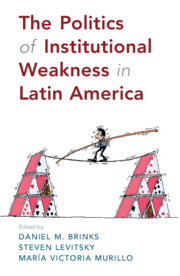Book contents
- The Politics of Institutional Weakness in Latin America
- The Politics of Institutional Weakness in Latin America
- Copyright page
- Contents
- Figures
- Maps
- Tables
- Contributors
- Acknowledgments
- 1 The Political Origins of Institutional Weakness
- 2 When (Electoral) Opportunity Knocks
- 3 The Stickiness of “Bad” Institutions
- 4 Presidential Crises in Latin America
- 5 Coercion Gaps
- 6 Aspirational Laws as Weak Institutions
- 7 The Social Determinants of Enforcement
- 8 A Multilevel Approach to Enforcement
- 9 What/Whose Property Rights?
- 10 Imported Institutions
- 11 Social Origins of Institutional Strength
- 12 Conclusion
- Bibliography
- Index
3 - The Stickiness of “Bad” Institutions
Constitutional Continuity and Change under Democracy
Published online by Cambridge University Press: 06 May 2020
- The Politics of Institutional Weakness in Latin America
- The Politics of Institutional Weakness in Latin America
- Copyright page
- Contents
- Figures
- Maps
- Tables
- Contributors
- Acknowledgments
- 1 The Political Origins of Institutional Weakness
- 2 When (Electoral) Opportunity Knocks
- 3 The Stickiness of “Bad” Institutions
- 4 Presidential Crises in Latin America
- 5 Coercion Gaps
- 6 Aspirational Laws as Weak Institutions
- 7 The Social Determinants of Enforcement
- 8 A Multilevel Approach to Enforcement
- 9 What/Whose Property Rights?
- 10 Imported Institutions
- 11 Social Origins of Institutional Strength
- 12 Conclusion
- Bibliography
- Index
Summary
Most countries in the world operate under authoritarian constitutions. Historically, Latin American countries have been overrepresented in this group. Many of these authoritarian constitutions have proven remarkably sticky. The most long-lived ones not only govern the authoritarian regimes that pen them but subsequently constrain democratic successors long after the end of dictatorship.
On average, these constitutions are relatively strong as defined in this volume: they achieve their statutory goals and produce outcomes their authors and bequeathers intended them to produce. Historically, their authors and bequeathers have used them to satisfy a narrow set of objectives: secure the safety and welfare of outgoing dictators as well as safeguard the political and economic interests of their core supporters. These constitutions are also consequential, distorting democracy in favor of these former dictators and supporters.
- Type
- Chapter
- Information
- The Politics of Institutional Weakness in Latin America , pp. 61 - 97Publisher: Cambridge University PressPrint publication year: 2020



